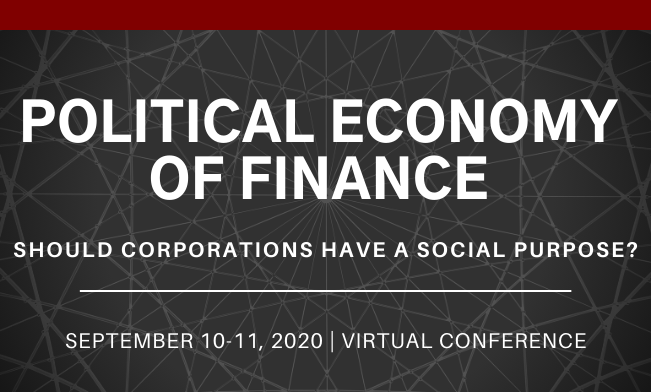Stakeholderism—granting corporate leaders discretion to give weight to the interest of all stakeholders—should not be expected to deliver its purported benefits to stakeholders. Furthermore, it could well impose substantial costs on shareholders, stakeholders themselves, and society at large, and therefore should be rejected, even by those who are deeply concerned about stakeholders.
Editor’s note: To mark the 50-year anniversary of Milton Friedman’s influential NYT piece on the social responsibility of business, we are launching a series of articles on the shareholder-stakeholder debate. Read previous installments here.
In The Illusory Promise of Stakeholder Governance, which we will present at the Stigler Center’s Political Economy of Finance conference later this week, we critically examine “stakeholderism,” the increasingly influential view that corporate leaders should give weight to the interests of non-shareholder constituencies (stakeholders).
Acceptance of stakeholderism, we demonstrate, would not benefit stakeholders as supporters of this view claim. Corporate leaders have incentives, and should therefore be expected, not to use their discretion to benefit stakeholders beyond what would serve shareholder value. Furthermore, over the past two decades, corporate leaders have in fact failed to use this kind of discretion to protect stakeholders. Our analysis concludes that acceptance of stakeholderism should not be expected to make stakeholders better off.
Embracing stakeholderism, we find, could well impose substantial costs on shareholders, stakeholders, and society at large. Stakeholderism would increase the insulation of corporate leaders from shareholders, reduce their accountability, and hurt economic performance. In addition, by raising illusory hopes that corporate leaders would on their own provide substantial protection to stakeholders, stakeholderism would impede or delay reforms that could bring meaningful protection to stakeholders. Stakeholderism would therefore be contrary to the interests of the stakeholders it purports to serve and should be opposed by those who take stakeholder interests seriously.
Some stakeholderists have already attempted to respond to our findings and conclusions. Oxford Professor Colin Mayer issued a response paper, the prominent law firm Wachtell, Lipton, Rosen & Katz published a critical memorandum, and Business Roundtable President Joshua Bolten took issue with our assessment of the Roundtable’s statement on corporate purpose in a Financial Times interview. We plan to incorporate replies to these and other responses in our study, and we look forward to getting additional reactions from participants in the Stigler Center conference.
Stakeholderism, which provided the basis for antitakeover legislation adopted in the 1980s and 1990s by a majority of US states, has gained substantial support in recent years among academics, practitioners, business leaders, and policymakers. The long-standing debate on corporate purpose is now at a critical juncture, and the growing embrace of stakeholderism might well in the coming years have considerable influence on companies, their stakeholders, and society.
Before discussing the problems with implementing stakeholderism, it’s important to distinguish between two different versions of stakeholderism and discusses their conceptual problems. According to the “enlightened shareholder value” version, corporate leaders—a term we use throughout to refer to the directors and top executives who make important corporate decisions—should take into account stakeholder interests as a means to maximize shareholder value. Such an instrumental version of stakeholderism, we show, is not conceptually different from shareholder primacy; it is merely a semantic change, and we show that there are no good reasons for adopting it.
According to the second version, by contrast, corporate leaders can and should regard stakeholder interests as ends in themselves. This view, which we call “pluralistic,” posits that the welfare of each stakeholder group has independent value, and consideration for stakeholders might entail providing them with some benefits at the expense of shareholders. This version is the one that in theory—though, as we shall show, not in practice—could lead to decisions that would benefit stakeholders beyond what would be useful for shareholder value maximization.
Pluralistic stakeholderism and its implementation raise several conceptual problems and difficulties. In particular, advocates of stakeholderism have commonly avoided the difficult issue of determining which groups should be considered stakeholders, leaving this decision to the discretion of corporate leaders, and tended to overlook the ubiquity of situations that present trade-offs between the interests of some stakeholders and long-term shareholder value.
They also haven’t provided a method to aggregate or balance the interests of different constituencies in the face of such trade-offs, leaving this matter, again, to the discretion of corporate leaders. Thus, the effects of pluralistic stakeholderism would critically depend on how corporate leaders choose to exercise discretion.
Before examining the effects of stakeholderism in general, it’s worthwhile to consider the expected effects of the widely celebrated Business Roundtable statement. Based on a close reading of the statement and of the accompanying materials, as well as on evidence that we collected, our study shows that the statement is largely a rhetorical public-relations move rather than the harbinger of meaningful change.
In particular, we discuss
(1) the statement’s ambiguity regarding the critical question of whether it advocates providing stakeholders with any benefits beyond what would be useful for shareholder value,
(2) the statement’s disregard of the ubiquity of trade-offs between stakeholder and shareholder interests,
(3) the decision by many CEOs to join the statement without the approval by the board of directors that is generally obtained for major corporate decisions,
(4) the failure to reflect the commitment to stakeholders in corporate governance guidelines, and
(5) the lack of attention to legal constraints that preclude many companies from approaching stakeholder interests as an independent end.
Our analysis of each of these dimensions indicates that the Business Roundtable statement should not be expected, and was largely not intended by its signatories, to bring about major changes in the treatment of stakeholders.
Putting aside the effects of the Business Roundtable statement, we examine the potential effects of stakeholderism in general and present an economic and empirical analysis of how corporate leaders should be expected to use discretion to protect stakeholder interests. We show and empirically document that corporate leaders (both directors and CEOs) have strong incentives to enhance shareholder value but little incentive to treat stakeholder interests as an independent end.
Therefore, we argue, corporate leaders have significant incentives not to benefit stakeholders at the expense of shareholder value, and they should therefore not be expected to use the discretion awarded to them to do so.
In reaching this conclusion, we relied on the findings of a companion empirical study that we have conducted together with Kobi Kastiel,For Whom Corporate Leaders Bargain. The study examines whether, in fact, corporate leaders have in the past used discretion accorded to them to protect stakeholders.
During the hostile takeover era, stakeholderist arguments contributed to the adoption in many states of constituency statutes, which authorize corporate leaders to give weight to stakeholder interests when considering a sale of their company. Our empirical work analyzes in detail over 100 private equity acquisitions of companies governed by constituency statutes that corporate leaders negotiated over the past two decades.
Our empirical investigation finds that corporate leaders governed by constituency statutes used their bargaining power to obtain gains for shareholders, as well as for executives and directors. However, corporate leaders made very little use of their power to negotiate for stakeholder protections.
Furthermore, in cases in which some protections were included, they were practically inconsequential or cosmetic. This evidence is consistent with and reinforces our conclusion that corporate leaders who have discretion to do so should not be expected to benefit stakeholders beyond what would serve shareholders.
“The acceptance of stakeholderism, by raising illusory hopes around the positive effects for stakeholders, would likely weaken pressures for stakeholder-oriented policy reforms and thereby impede or delay meaningful protection for stakeholders.”
The business corporation has proven itself to be a powerful and adaptive mechanism for producing economic growth and prosperity. As a result, some of those who wish to protect stakeholders might be attracted to stakeholderism as a way to do so by harnessing corporate power through private action and without resort to costly regulation.
However, the past success of corporations has been based on the presence of effective incentives for corporate decision makers. Therefore, with corporate leaders having incentives not to benefit stakeholders at shareholders’ expense, delegating the guardianship of stakeholder interests to corporate leaders would prove futile. The promise of pluralistic stakeholderism, we conclude, is illusory.
Finally, whereas stakeholderists have advocated relying on corporate leaders to protect stakeholders without a major overhaul of existing systems of incentives, including those resulting from shareholders’ exclusive voting power, we also consider the possibility of supplementing stakeholderism with reforms aimed at substantially changing the incentives of corporate leaders.
We examine changes both to executive pay arrangements and to the rules governing the election of directors. Designing reforms that would provide leaders with adequate incentives to attach independent weight to the interests of all stakeholders, we show, would be quite challenging as well as very costly.
It might be argued that stakeholderism, even if it does not provide significant benefits to stakeholders, could not hurt and might even help on the margin. As our findings show, however, accepting stakeholderism would be detrimental to shareholders, stakeholders, and society.
The acceptance of stakeholderism would insulate corporate leaders from shareholder pressures and make them less accountable. Indeed, we argue, the support of corporate leaders and their advisors for stakeholderism is motivated, at least in part, by a desire to obtain insulation from hedge fund activists and institutional investors. In other words, they seek to advance managerialism by putting it in stakeholderism clothing.
The increased insulation from shareholders, and the reduced accountability to them, would serve the private interests of corporate leaders. It would also increase managerial slack and agency costs and undermine economic performance. This would have detrimental effects for shareholders and the economy at large.
The acceptance of stakeholderism, by raising illusory hopes around the positive effects for stakeholders, would likely weaken pressures for stakeholder-oriented policy reforms and thereby impede or delay meaningful protection for stakeholders. Thus, for those interested in addressing corporate externalities and protecting corporate stakeholders, embracing stakeholderism would be counterproductive.
Our study is available here, and comments would be most welcome.







